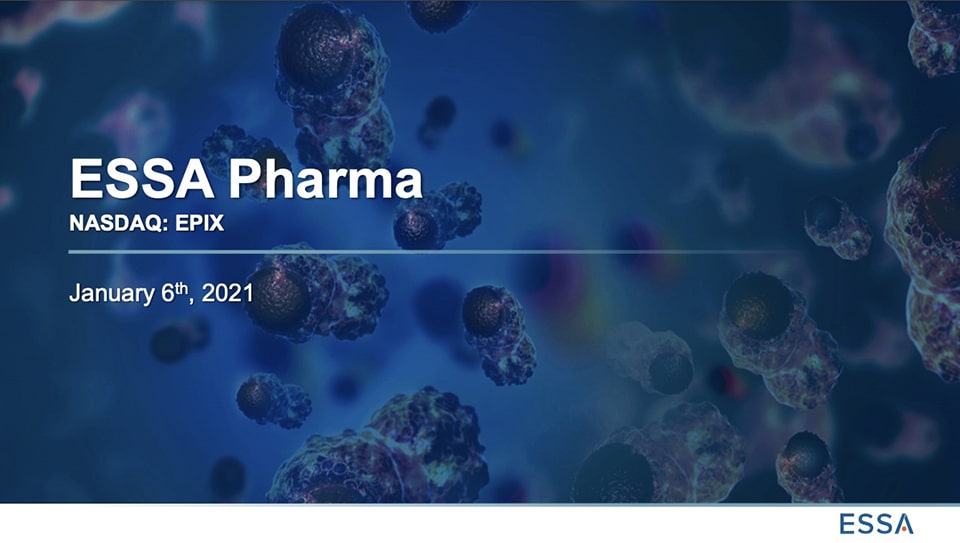
Efficacy signals observed will not achieve ESSA's target product profile in patients with metastatic castration-resistant prostate cancer naïve to second-generation antiandrogens
A futility analysis conducted as part of a protocol-specified interim review of the safety, PK and efficacy data showed the single-agent enzalutamide control arm performing better than historical controls and similar to the combination of masofaniten and enzalutamide and therefore, unlikely to achieve the primary endpoint of the study
Additional clinical studies with masofaniten including the combination study with abiraterone acetate and apalutamide as well as the remaining investigator sponsored trials will also be terminated and the IND and CTAs in different geographies will be withdrawn
Company will initiate a process to explore and review strategic options focused on maximizing shareholder value
SOUTH SAN FRANCISCO, California and VANCOUVER, Canada, Oct. 31, 2024 /CNW/ - ESSA Pharma Inc. ("ESSA", or the "Company") (NASDAQ: EPIX), a clinical-stage pharmaceutical company focused on developing novel therapies for the treatment of prostate cancer, today announced that it has made the decision to terminate the Phase 2 clinical trial evaluating in a 2:1 randomization masofaniten combined with enzalutamide versus enzalutamide single agent in patients with metastatic castration-resistant prostate cancer ("mCRPC") naïve to second-generation antiandrogens. This decision, mutually agreed upon by both senior management and the board of directors, was based on a protocol-specified interim review of the safety, PK and efficacy data, which showed a much higher rate of PSA90 response in patients treated with enzalutamide monotherapy (which is standard of care for this patient population) than were expected based upon historical data. In addition, there was no clear efficacy benefit seen with the combination of masofaniten plus enzalutamide compared to enzalutamide single agent. A futility analysis determined a low likelihood of meeting the prespecified primary endpoint of the study. The combination of masofaniten plus enzalutamide was well-tolerated with no new safety signals and a safety profile similar to that seen in Phase 1 studies.
"Providing a meaningful clinical benefit to patients in our clinical trials, along with a robust safety profile, is of utmost importance to us at ESSA," said David Parkinson, MD, President and CEO. "We designed this randomized study to rigorously evaluate the clinical benefit of adding masofaniten to enzalutamide. We made the difficult decision to terminate this Phase 2 study following the interim analysis because we concluded that the emerging efficacy profile of masofaniten combined with enzalutamide would not likely meet the primary endpoint of the study, nor our internal requirements for a prostate cancer therapy candidate. We would like to thank our partners, investigators, employees, and most importantly, the patients and their families involved in our clinical trials."
Richard Glickman, LLD, Chairman of the Board of Directors of ESSA, commented, "Senior management, together with the board of directors, are actively focused on preserving capital and will initiate a strategic process to explore and review a range of strategic options focused on maximizing shareholder value."
The Phase 2 study (NCT05075577) was designed as an open label, two-arm randomized (2:1) trial and was planned to enroll a total of 120 patients (80 in the combination arm and 40 in the enzalutamide single agent arm). The efficacy interim analysis included 52 enrolled patients (48% of the total planned patients) who had at least one PSA measurement after baseline and 41 patients (34% of total planned patients) who completed at least three months follow up. Enrolled patients were from clinical sites located in the United States, Canada, Australia and France. The primary study endpoint is the proportion of patients reaching PSA90. Additional PSA-based secondary endpoints included PSA50 response as well as PSA50 and PSA90 response rates at 12 weeks as well as time to event parameters (which were not mature at the time of the interim analysis).
Primary and PSA-related Secondary Endpoints of the Study
Primary | Secondary | Secondary | Secondary | |
Phase 2 Study Arm | PSA90 response rate* | PSA50 response rate* | PSA50 @ 90 days response rate | PSA90 @ 90 days response rate |
Enzalutamide 160mg QD | 73 % | 87 % | 86 % | 71 % |
Masofaniten 600mg BID + enzalutamide 160mg QD | 64 % | 88 % | 93 % | 67 % |
*The PSA90 response rate was calculated in patients completing at least 1 month of treatment |
As part of the effort to focus its resources, ESSA is also planning to terminate the other remaining company-sponsored and investigator-sponsored clinical studies evaluating masofaniten either as a monotherapy or in combination with other agents.
Liquidity and Outstanding Share Capital
- As of September 30, 2024, the Company had available cash reserves and short-term investments of $126.8 million and net working capital of $124.3 million (unaudited figures). The Company has no long-term debt facilities.
- As of September 30, 2024, the Company had 44,388,551 common shares issued and outstanding, and there were 2,920,000 common shares issuable upon the exercise of prefunded warrants at an exercise price of $0.0001.
About the Phase 2 Study
The Phase 2 dose expansion portion of this Phase 1/2 study is a two-arm, randomized, open-label study (NCT05075577) that evaluated the safety, tolerability and preliminary efficacy of masofaniten, and was expected to enroll approximately 120 patients. Criteria for entry into the Phase 2 dose expansion were similar to those in the Phase 1 dose escalation. Patients continued to receive androgen deprivation therapy and were randomized 2:1 to receive either the combination of masofaniten (600mg twice-daily ("BID")) and enzalutamide (160mg once daily ("QD")) or enzalutamide (160mg QD) as a single agent. Patients were eligible to remain on study treatment as long as they tolerated treatment without disease progression based on RECIST v1.1 and/or Prostate Cancer Clinical Trials Working Group 3 (PCWG3) criteria.
About Masofaniten
Masofaniten (formerly known as EPI-7386) is a first-in-class investigational oral, small molecule inhibitor of the androgen receptor ("AR"). Masofaniten's unique mechanism of action disrupts the AR signaling pathway, the primary pathway that drives prostate cancer growth. The U.S. Food and Drug Administration has granted Fast Track designation to masofaniten for the treatment of adult male patients with mCRPC resistant to standard-of-care treatment. ESSA retains all rights to masofaniten worldwide.
About ESSA Pharma Inc.
ESSA is a clinical-stage pharmaceutical company focused on developing novel and proprietary therapies for the treatment of patients with prostate cancer. For more information, please visit www.essapharma.com, and follow us on X and LinkedIn.
Forward-Looking Statement Disclaimer
This release contains certain information which, as presented, constitutes "forward-looking statements" within the meaning of the Private Securities Litigation Reform Act of 1995 and "forward-looking information" within the meaning of applicable Canadian securities laws (collectively, "forward-looking statements"). Forward-looking statements include, but are not limited to, statements that relate to future events and often addresses expected future business and financial performance, containing words such as "anticipate", "believe", "plan", "estimate", "expect", and "intend", statements that an action or event "may", "might", "could", "should", or "will" be taken or occur, or other similar expressions and includes, but is not limited to, statements regarding the termination of the Company's clinical studies of masofaniten, the Company's financial resources, the evaluation of the Company's strategic alternatives, the primary and PSA-related endpoints of the Phase 2 study and other statements surrounding the Company's evaluation of masofaniten.
Forward-looking statements are subject to various known and unknown risks and uncertainties, many of which are beyond the ability of ESSA to control or predict, and which may cause ESSA's actual results, performance or achievements to be materially different from those expressed or implied thereby. Such statements reflect ESSA's current views with respect to future events, are subject to risks and uncertainties and are necessarily based upon a number of estimates and assumptions that, while considered reasonable by ESSA as of the date of such statements, are inherently subject to significant medical, scientific, business, economic, competitive, political and social uncertainties and contingencies. In making forward looking statements, ESSA may make various material assumptions, including but not limited to (i) the accuracy of ESSA's financial projections; (ii) obtaining positive results of clinical trials; (iii) obtaining necessary regulatory approvals; and (iv) general business, market and economic conditions.
Forward-looking statements are developed based on assumptions about such risks, uncertainties and other factors set out herein and in ESSA's Annual Report on Form 10-K dated December 12, 2023, under the heading "Risk Factors", a copy of which is available on ESSA's profile on EDGAR at www.sec.gov and on SEDAR+ at www.sedarplus.ca, and as otherwise disclosed from time to time on ESSA's EDGAR and SEDAR+ profiles. Forward-looking statements are made based on management's beliefs, estimates and opinions on the date that statements are made and ESSA undertakes no obligation to update forward-looking statements if these beliefs, estimates and opinions or other circumstances should change, except as may be required by applicable United States and Canadian securities laws. Readers are cautioned against attributing undue certainty to forward-looking statements.
Contacts
ESSA Pharma, Inc.
Peter Virsik, Chief Operating Officer
778.331.0962
pvirsik@essapharma.com
Investors and Media:
Argot Partners
212.600.1902
essa@argotpartners.com
SOURCE ESSA Pharma Inc

